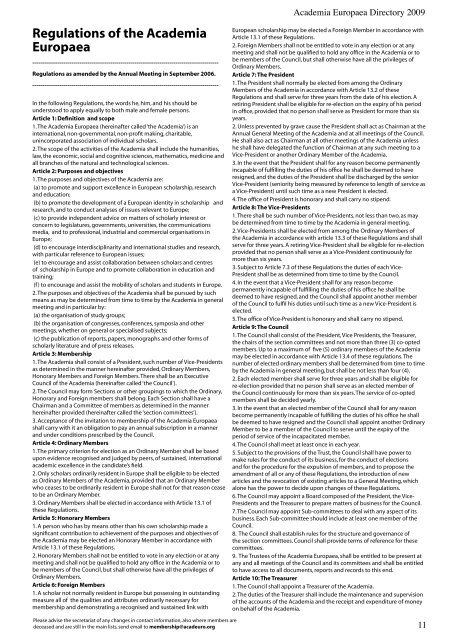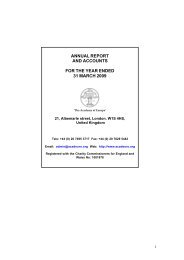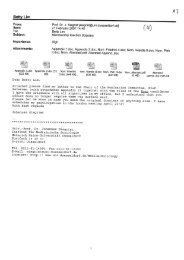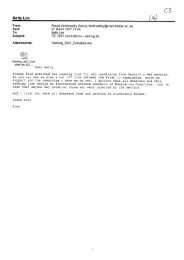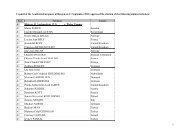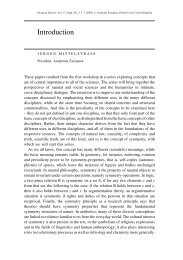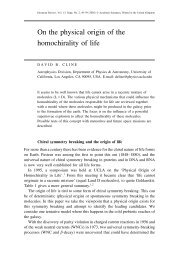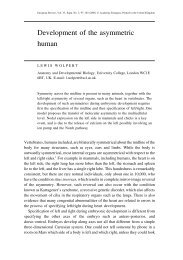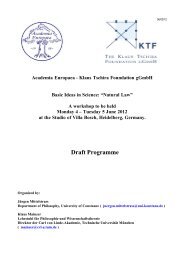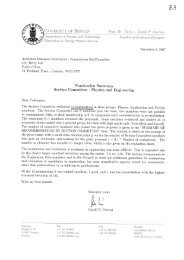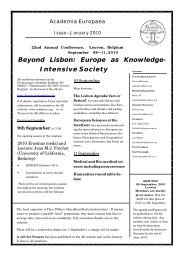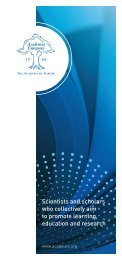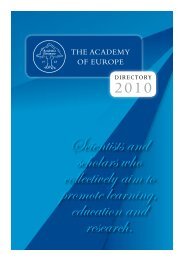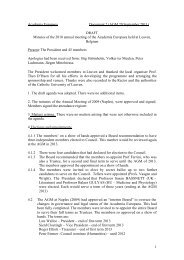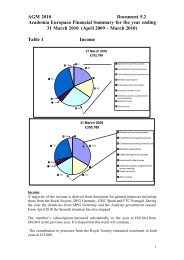DIRECTORY 2009 - Academia Europaea
DIRECTORY 2009 - Academia Europaea
DIRECTORY 2009 - Academia Europaea
You also want an ePaper? Increase the reach of your titles
YUMPU automatically turns print PDFs into web optimized ePapers that Google loves.
Regulations of the <strong>Academia</strong><br />
<strong>Europaea</strong><br />
-----------------------------------------------------------------------------------------------<br />
Regulations as amended by the Annual Meeting in September 2006.<br />
-----------------------------------------------------------------------------------------------<br />
In the following Regulations, the words he, him, and his should be<br />
understood to apply equally to both male and female persons.<br />
Article 1: Definition and scope<br />
1. The <strong>Academia</strong> <strong>Europaea</strong> (hereinafter called ‘the <strong>Academia</strong>’) is an<br />
international, non-governmental, non-profit making, charitable,<br />
unincorporated association of individual scholars.<br />
2. The scope of the activities of the <strong>Academia</strong> shall include the humanities,<br />
law, the economic, social and cognitive sciences, mathematics, medicine and<br />
all branches of the natural and technological sciences.<br />
Article 2: Purposes and objectives<br />
1. The purposes and objectives of the <strong>Academia</strong> are:<br />
(a) to promote and support excellence in European scholarship, research<br />
and education;<br />
(b) to promote the development of a European identity in scholarship and<br />
research, and to conduct analyses of issues relevant to Europe;<br />
(c) to provide independent advice on matters of scholarly interest or<br />
concern to legislatures, governments, universities, the communications<br />
media, and to professional, industrial and commercial organisations in<br />
Europe;<br />
(d) to encourage interdisciplinarity and international studies and research,<br />
with particular reference to European issues;<br />
(e) to encourage and assist collaboration between scholars and centres<br />
of scholarship in Europe and to promote collaboration in education and<br />
training;<br />
(f ) to encourage and assist the mobility of scholars and students in Europe.<br />
2. The purposes and objectives of the <strong>Academia</strong> shall be pursued by such<br />
means as may be determined from time to time by the <strong>Academia</strong> in general<br />
meeting and in particular by:<br />
(a) the organisation of study groups;<br />
(b) the organisation of congresses, conferences, symposia and other<br />
meetings, whether on general or specialised subjects;<br />
(c) the publication of reports, papers, monographs and other forms of<br />
scholarly literature and of press releases.<br />
Article 3: Membership<br />
1. The <strong>Academia</strong> shall consist of a President, such number of Vice-Presidents<br />
as determined in the manner hereinafter provided, Ordinary Members,<br />
Honorary Members and Foreign Members. There shall be an Executive<br />
Council of the <strong>Academia</strong> (hereinafter called ‘the Council’).<br />
2. The Council may form Sections or other groupings to which the Ordinary,<br />
Honorary and Foreign members shall belong. Each Section shall have a<br />
Chairman and a Committee of members as determined in the manner<br />
hereinafter provided (hereinafter called the ‘section committees’).<br />
3. Acceptance of the invitation to membership of the <strong>Academia</strong> <strong>Europaea</strong><br />
shall carry with it an obligation to pay an annual subscription in a manner<br />
and under conditions prescribed by the Council.<br />
Article 4: Ordinary Members<br />
1. The primary criterion for election as an Ordinary Member shall be based<br />
upon evidence recognised and judged by peers, of sustained, international<br />
academic excellence in the candidate’s field.<br />
2. Only scholars ordinarily resident in Europe shall be eligible to be elected<br />
as Ordinary Members of the <strong>Academia</strong>, provided that an Ordinary Member<br />
who ceases to be ordinarily resident in Europe shall not for that reason cease<br />
to be an Ordinary Member.<br />
3. Ordinary Members shall be elected in accordance with Article 13.1 of<br />
these Regulations.<br />
Article 5: Honorary Members<br />
1. A person who has by means other than his own scholarship made a<br />
significant contribution to achievement of the purposes and objectives of<br />
the <strong>Academia</strong> may be elected an Honorary Member in accordance with<br />
Article 13.1 of these Regulations.<br />
2. Honorary Members shall not be entitled to vote in any election or at any<br />
meeting and shall not be qualified to hold any office in the <strong>Academia</strong> or to<br />
be members of the Council, but shall otherwise have all the privileges of<br />
Ordinary Members.<br />
Article 6: Foreign Members<br />
1. A scholar not normally resident in Europe but possessing in outstanding<br />
measure all of the qualities and attributes ordinarily necessary for<br />
membership and demonstrating a recognised and sustained link with<br />
<strong>Academia</strong> <strong>Europaea</strong> Directory <strong>2009</strong><br />
European scholarship may be elected a Foreign Member in accordance with<br />
Article 13.1 of these Regulations.<br />
2. Foreign Members shall not be entitled to vote in any election or at any<br />
meeting and shall not be qualified to hold any office in the <strong>Academia</strong> or to<br />
be members of the Council, but shall otherwise have all the privileges of<br />
Ordinary Members.<br />
Article 7: The President<br />
1. The President shall normally be elected from among the Ordinary<br />
Members of the <strong>Academia</strong> in accordance with Article 13.2 of these<br />
Regulations and shall serve for three years from the date of his election. A<br />
retiring President shall be eligible for re-election on the expiry of his period<br />
in office, provided that no person shall serve as President for more than six<br />
years.<br />
2. Unless prevented by grave cause the President shall act as Chairman at the<br />
Annual General Meeting of the <strong>Academia</strong> and at all meetings of the Council.<br />
He shall also act as Chairman at all other meetings of the <strong>Academia</strong> unless<br />
he shall have delegated the function of Chairman at any such meeting to a<br />
Vice-President or another Ordinary Member of the <strong>Academia</strong>.<br />
3. In the event that the President shall for any reason become permanently<br />
incapable of fulfilling the duties of his office he shall be deemed to have<br />
resigned, and the duties of the President shall be discharged by the senior<br />
Vice-President (seniority being measured by reference to length of service as<br />
a Vice-President) until such time as a new President is elected.<br />
4. The office of President is honorary and shall carry no stipend.<br />
Article 8: The Vice-Presidents<br />
1. There shall be such number of Vice-Presidents, not less than two, as may<br />
be determined from time to time by the <strong>Academia</strong> in general meeting.<br />
2. Vice-Presidents shall be elected from among the Ordinary Members of<br />
the <strong>Academia</strong> in accordance with article 13.3 of these Regulations and shall<br />
serve for three years. A retiring Vice-President shall be eligible for re-election<br />
provided that no person shall serve as a Vice-President continuously for<br />
more than six years.<br />
3. Subject to Article 7.3 of these Regulations the duties of each Vice-<br />
President shall be as determined from time to time by the Council.<br />
4. In the event that a Vice-President shall for any reason become<br />
permanently incapable of fulfilling the duties of his office he shall be<br />
deemed to have resigned, and the Council shall appoint another member<br />
of the Council to fulfil his duties until such time as a new Vice-President is<br />
elected.<br />
5. The office of Vice-President is honorary and shall carry no stipend.<br />
Article 9: The Council<br />
1. The Council shall consist of the President, Vice Presidents, the Treasurer,<br />
the chairs of the section committees and not more than three (3) co-opted<br />
members. Up to a maximum of five (5) ordinary members of the <strong>Academia</strong><br />
may be elected in accordance with Article 13.4 of these regulations. The<br />
number of elected ordinary members shall be determined from time to time<br />
by the <strong>Academia</strong> in general meeting, but shall be not less than four (4).<br />
2. Each elected member shall serve for three years and shall be eligible for<br />
re-election provided that no person shall serve as an elected member of<br />
the Council continuously for more than six years. The service of co-opted<br />
members shall be decided yearly.<br />
3. In the event that an elected member of the Council shall for any reason<br />
become permanently incapable of fulfilling the duties of his office he shall<br />
be deemed to have resigned and the Council shall appoint another Ordinary<br />
Member to be a member of the Council to serve until the expiry of the<br />
period of service of the incapacitated member.<br />
4. The Council shall meet at least once in each year.<br />
5. Subject to the provisions of the Trust, the Council shall have power to<br />
make rules for the conduct of its business, for the conduct of elections<br />
and for the procedure for the expulsion of members, and to propose the<br />
amendment of all or any of these Regulations, the introduction of new<br />
articles and the revocation of existing articles to a General Meeting, which<br />
alone has the power to decide upon changes of these Regulations.<br />
6. The Council may appoint a Board composed of the President, the Vice-<br />
Presidents and the Treasurer to prepare matters of business for the Council.<br />
7. The Council may appoint Sub-committees to deal with any aspect of its<br />
business. Each Sub-committee should include at least one member of the<br />
Council.<br />
8. The Council shall establish rules for the structure and governance of<br />
the section committees. Council shall provide terms of reference for these<br />
committees.<br />
9. The Trustees of the <strong>Academia</strong> <strong>Europaea</strong>, shall be entitled to be present at<br />
any and all meetings of the Council and its committees and shall be entitled<br />
to have access to all documents, reports and records to this end.<br />
Article 10: The Treasurer<br />
1. The Council shall appoint a Treasurer of the <strong>Academia</strong>.<br />
2. The duties of the Treasurer shall include the maintenance and supervision<br />
of the accounts of the <strong>Academia</strong> and the receipt and expenditure of money<br />
on behalf of the <strong>Academia</strong>.<br />
Please advise the secretariat of any changes in contact information, also where members are<br />
deceased and are still in the main lists, send email to membership@acadeuro.org<br />
11


